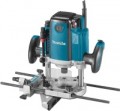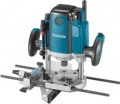Power
The total power of the router, more precisely, the engine installed in it. The
higher this indicator, the more productive the device is, the better it copes with complex work, the more force on the cutter (torque) it provides during operation, and the greater the spindle speed can be (although a powerful tool is not necessarily high-speed). On the other hand, high power significantly affects the dimensions, weight and price of the tool, plus power consumption and network load increase accordingly. In addition, high torque in some cases (for example, with delicate processing) is frankly undesirable. Therefore, a tool should be chosen according to this parameter, taking into account the real needs and the specifics of the planned work.
There are three main categories of milling cutters in terms of power: light (up to 700 W), designed mainly for simple household work; medium (up to 1500 W), able to cope not only with domestic, but also with most professional tasks; and heavy (1500 W or more), used in cases where high power is critical. However, this gradation is true only for routers (see "Type"), other varieties have their own specifics: for example, lamellar models, in principle, do not need high power.
Noise level
The noise level produced by the router during operation. This parameter is quite approximate, since the actual “loudness” depends not only on the characteristics of the tool itself, but also on the material and shape of the workpiece being processed, the type of cutter, the speed of work, etc. Therefore, in fact, the noise level may differ both up and down; in the characteristics, a certain average value is given, by which, however, it is quite worthwhile to navigate.
The “quieter” the tool, the more comfortable it will be to work with it, the less likely it is that the operator will need protective headphones. At the same time, we note that routers, by definition, are quite noisy — the most “quiet” models give out about 75 dB. Also, keep in mind that the decibel is a non-linear quantity, so it is best to use comparison tables when estimating the noise level.
Here is a simplified version of such a table for the range in which most modern routers operate:
75 dB — scream, loud laughter at a distance of 1 m;
80 dB — motorcycle engine, mechanical alarm at the same distance;
85 dB — a loud cry at the same distance;
90 dB — demolition hammer at a distance of 1 m, a freight car at a distance of 7 – 10 m;
95 dB — subway car (inside or at a distance of about 7 m).

